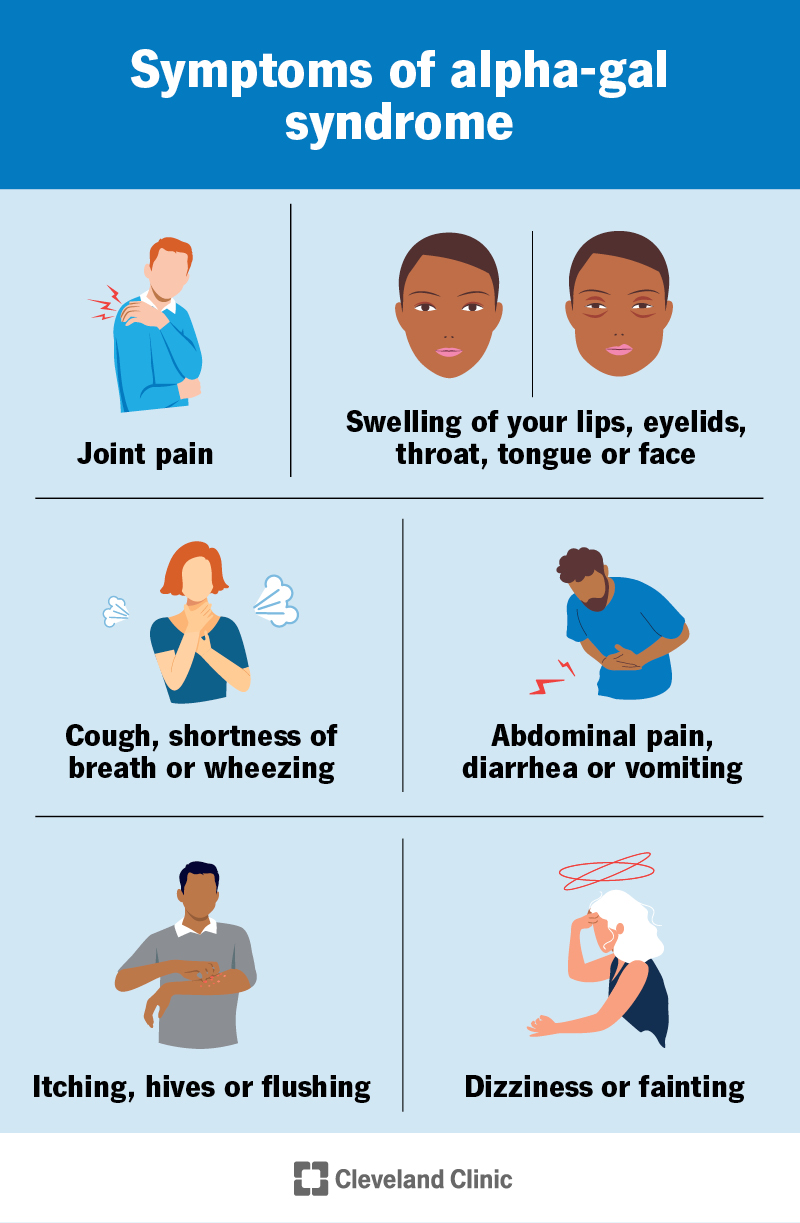Alpha-gal syndrome is a type of food allergy that develops after getting bitten by a tick. It causes allergic reactions to red meat and products made with it. You can get it from many kinds of ticks, but the lone star tick bite is the most common cause. Not everyone bitten by a tick will develop alpha-gal. Repeated tick bites can make it worse.
Advertisement
Cleveland Clinic is a non-profit academic medical center. Advertising on our site helps support our mission. We do not endorse non-Cleveland Clinic products or services. Policy

Image content: This image is available to view online.
View image online (https://my.clevelandclinic.org/-/scassets/images/org/health/articles/alpha-gal-syndrome)
Alpha-gal syndrome (AGS) is an allergy to red meat, meat products and dairy that you develop after getting bitten by a tick. Products you might have an allergic reaction to include:
Advertisement
Cleveland Clinic is a non-profit academic medical center. Advertising on our site helps support our mission. We do not endorse non-Cleveland Clinic products or services. Policy
Alpha-gal is a carbohydrate (sugar) molecule found in most mammals (other than humans) and tick saliva. Not everyone who gets a tick bite develops alpha-gal syndrome. And it’s unlikely that you’ll have a reaction to every food or product that could contain alpha-gal.
Symptoms of alpha-gal syndrome range from mild to severe. Sometimes, they can be life-threatening. Symptoms include:
You might have digestive or skin symptoms on their own, or you might experience other symptoms along with them.
Alpha-gal can cause severe allergic reactions, including anaphylaxis. Anaphylaxis can make it difficult to breathe and cause a severe drop in blood pressure. It can be fatal. Call 911 (or your local emergency service number) or go to the ER at the first sign of severe symptoms.
Unlike many food allergies, which happen right after eating, symptoms of alpha-gal can happen two to six hours after eating meat or dairy. Medications that contain alpha-gal might be more likely to cause an immediate reaction.
Advertisement
You get alpha-gal syndrome from a tick bite. Lone star ticks are the most common cause. But bites from black-legged (deer) ticks and other species can also cause it.
Ticks have alpha-gal molecules in their saliva. Alpha-gal is a carbohydrate that’s found in most mammals, but not in people. When a tick bites you, you can become sensitized to the molecule and develop an allergy. Healthcare providers aren’t sure why some people develop an allergy after a tick bite and others don’t. Additional tick bites may make your symptoms worse or more frequent.
AGS is most common in South, East and Central parts of the U.S. This is where lone star ticks are most often found.
Healthcare providers diagnose alpha-gal syndrome with allergy blood tests and skin tests. It can be tricky to diagnose the cause of your reaction for many reasons:
It might be helpful to note when you have reactions and anything you’ve eaten or come in contact with that day. This might help you and your provider figure out the cause.
You can manage alpha-gal by avoiding foods, medications and personal care items that contain certain animal products. Your healthcare provider can work with you to come up with a list of potential triggers to avoid. New treatments, like omalizumab (Xolair®) injections and oral immunotherapy (OIT), might reduce your risk of a severe reaction if you’re accidentally exposed to alpha-gal.
Your provider will also prescribe antihistamines or an epinephrine auto-injector (EpiPen® or Auvi-Q®) to use if you have an unexpected reaction. A nasal spray of epinephrine (neffy®) is another option.
If you have to take a medication that could cause a reaction, your provider will work with you to determine your treatment options.
You should also avoid getting additional tick bites. They can make you more likely to have severe reactions.
Not everyone with alpha-gal syndrome reacts to the same foods and products. Some things you might need to avoid include:
While not as common, you might also react to:
Advertisement
Ask your allergist about which foods and products are safe for you.
Talk to your healthcare provider if you have symptoms of alpha-gal syndrome. If you have an AGS diagnosis, check with your provider before getting vaccines to see if they could potentially cause a reaction.
Sometimes. Some people find they can reintroduce foods containing alpha-gal without symptoms after avoiding them for a year or two. Avoiding additional tick bites can make it more likely that AGS gets better. But you should talk to your healthcare provider before trying to eat foods that could cause a reaction.
The most effective way to avoid getting AGS is to avoid getting tick bites. Ways to reduce your risk include:
Advertisement
Having alpha-gal syndrome isn’t just about passing on burgers and steaks. Like all food allergies, there might be a wide range of products you need to avoid. While you have to be cautious, most people with AGS don’t have a reaction to every product that could contain alpha-gal. And for some, their symptoms get better within a few years. Your healthcare provider can help you know which foods to avoid and what to expect in your specific situation.
Advertisement

Sign up for our Health Essentials emails for expert guidance on nutrition, fitness, sleep, skin care and more.
Learn more about the Health Library and our editorial process.
Cleveland Clinic’s health articles are based on evidence-backed information and review by medical professionals to ensure accuracy, reliability and up-to-date clinical standards.
Cleveland Clinic’s health articles are based on evidence-backed information and review by medical professionals to ensure accuracy, reliability and up-to-date clinical standards.
When you have a food allergy, you might worry a lot about what to eat so you don’t have a reaction. Cleveland Clinic can ease your fears and treat your allergies.
